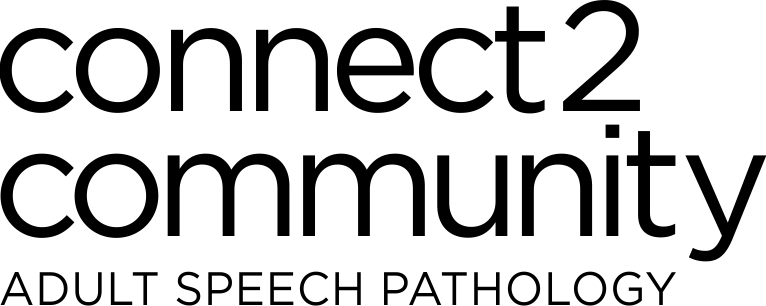WORKSHOPS
connect2community advocates for training and professional development workshops to be accessible to all members (i.e., families, carers, health professionals, staff and support workers) of the interprofessional care team, across all settings (i.e., home, health, community and residential aged care) that provide services to persons with communication and mealtime support needs (including dysphagia management).
connect2community speech pathologists will deliver current, relevant and evidence-based speech pathology education and training specific to your home, health or community setting requirements. Our education and training sessions can be delivered as formal presentations or as more informal ‘toolkit’ sessions ranging from 30 minutes to 2-3 hours.
The aim of our educational workshops is to improve the knowledge and/or skills of the learner and to ensure the health and wellbeing of the person with a communication or swallowing impairment is maintained.
Talks, workshops and seminars can be presented to:
Nursing and care staff
Clinical and managerial staff
Chefs, catering and kitchen staff
Families, carers and support workers of a person with communication and/or mealtime supports (home-based education workshop)
Health professionals in the community
KEY EDUCATION AREAS
Swallowing (Dysphagia)
Understanding the role of speech pathologists in assessing and managing dysphagia (swallowing difficulties) and communication at mealtimes
Identifying symptoms of dysphagia and signs and symptoms of aspiration (food/drink going down the wrong way)
Identifying potential risks associated with unsafe feeding practices and non-compliance with recommendations
Understanding and implementing the International Dysphagia Diet Standards (IDDSI) and the modification of foods and fluids as per IDDSI standards
Mealtime Management Plans
Use of adaptive equipment and other compensatory swallowing strategies (i.e., positioning, pacing, prompting) as per a mealtime management plan
Oral (mouth) care requirements
Facilitating resident choice and dignity around eating and drinking
Prioritising referrals to a speech pathologist
Communication
Understanding the role of speech pathologists in assessing and managing communication difficulties
The impact of (untreated) communication difficulties on a person’s life
Key ‘red’ flags to help us identify if a person has a communication difficulty
Communication Partner Training
Communication strategies (condition specific)
Prioritisng referrals to a speech pathologist
CONTACT US
For more information or to book an education and training workshop, please complete the form below and we will be in contact with you shortly.

